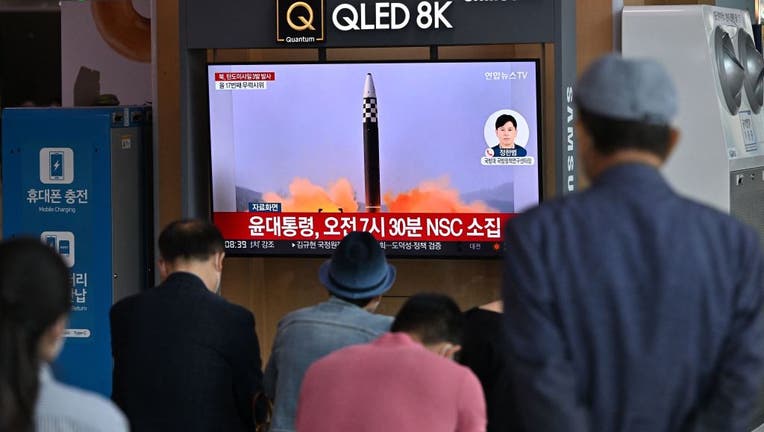S. Korea says N. Korea launched suspected intercontinental ballistic missile, 2 other missiles

People watch a television screen showing a news broadcast with file footage of a North Korean missile test, at a railway station in Seoul on May 25, 2022, after North Korea fired three ballistic missiles towards the Sea of Japan according to South Ko
SEOUL, South Korea (AP) - South Korea's government says one of the three weapons North Korea launched Wednesday was a suspected intercontinental ballistic missile. South Korea's government says the launches are "a grave provocation" that threaten international peace. It says North Korea will only face international isolation if it continues its provocation.
North Korea's long-range missile program is aimed at obtaining the ability to launch nuclear strikes on the mainland U.S. South Korea's military earlier said North Korea fired three ballistic missiles off the North's east coast, resuming its weapons launches after about two weeks. The launches came after President Joe Biden wrapped up his trip to Asia, where he reaffirmed the U.S. commitment to defend its allies in the face of the North's growing nuclear threat.
The North's first missile launches also came as the country makes a much-disputed claim that its first domestic COVID-19 outbreak is weakening.
South Korea's Joint Chiefs of Staff said in a statement that all three missiles were fired from near Pyongyang and flew toward waters off the North's eastern coast one after another between 6 a.m. and 7 a.m. on Wednesday (local time).
It said South Korea subsequently boosted its surveillance posture and maintained a military readiness in close coordination with the United States. South Korean President Yoon Suk Yeol separately called a National Security Council meeting to discuss the North's launches, his office said.
The U.S. Indo-Pacific Command said the missile launches highlight "the destabilizing impact of (North Korea's) illicit weapons program" though they didn't pose an immediate threat to U.S. territory and its allies. A command statement said the U.S. commitment to the defense of the South Korea and Japan "remains ironclad."
The White House said Biden has been briefed on the North Korean missile launches and will continue to be briefed as information develops.
Japanese Defense Minister Nobuo Kishi said the launches were "an act of provocation and absolutely impermissible." He accused North Korea of pressing ahead with its weapons development program while "ignoring the people's suffering amid the spread of the coronavirus in the country."
Kishi said one missile reached a maximum altitude of 550 kilometers (340 miles) while traveling 300 kilometers (186 miles), while another one flew 750 kilometers (470 miles) on a lower apogee of 50 kilometers (30 miles), before both landed outside Japan's exclusive economic zone.
The launches were North Korea's 17th round of missile firings this year. Experts have said North Korea's testing is aimed at modernizing its weapons arsenal and at applying pressure on its rivals to wrest sanctions relief and other concessions amid long-dormant nuclear diplomacy.
North Korea's unusual pace in weapons tests this year included its first test of an intercontinental ballistic missile since 2017 in March. U.S. and South Korean intelligence officials have said North Korea could soon conduct its first nuclear test in nearly five years as well.
After their summit in Seoul on Saturday, Biden and Yoon said they would consider expanded military exercises to deter North Korean nuclear threats.
Biden brushed aside questions about any possible provocation by North Korea during his trip, saying, "We are prepared for anything North Korea does." Asked if he had a message for the North's leader, Kim Jong Un, Biden offered a clipped response: "Hello. Period."
After his meetings in Seoul, Biden traveled to Japan and met with Prime Minister Fumio Kishida, where the leaders vowed to work closely to address security challenges, including North Korea's nuclear and ballistic programs, and also what they called China's "increasingly coercive" behavior in the region.
Hours before the North's missile launches, U.S. State Department spokesperson Ned Price told reporters in Washington that North Korea may be on the verge of a major weapons test. "Our concern for another potential provocation, be it an ICBM (intercontinental ballistic missile) launch, be a potential seventh nuclear weapons test, our concern has not abated in any way," he said.
Before Wednesday's launches, North Korea's most recent missile tests occurred hours after the country on May 12 acknowledged its COVID-19 outbreak on its soil, after maintaining a widely disputed claim to be coronavirus-free for more than two years.
The country has said in the past few days that there has been "a positive sign" in its anti-virus campaign. Some observers predicted that North Korea would soon resume its missile tests.
Since its admission of the outbreak of the highly contagious omicron variant, North Korea has said an unidentified fever has been spreading across the country since late April. It has stated how many people have fevers daily but identified just a fraction of the cases as COVID-19.
On Wednesday, North Korea's state media said 115,970 more people fell ill due to feverish symptoms in the past 24-hour period but there was no additional death. It's the second consecutive day that North Korea has claimed no fatality.
It said its total fever cases reached about 3 million people but only 68 of them died, an extremely low fatality rate if the illness is COVID-19 as suspected.
North Korea has limited testing capability for that many sick people, but some experts say it is also likely underreporting mortalities to prevent possible political damage on Kim.
North Korea has so far ignored South Korean and U.S. offers of humanitarian shipments of vaccines, medicines and other support items. Much of North Korea's 26 million people remain unvaccinated and the country's once-free socialist public health care system has been in shambles for decades.
------
Associated Press writer Mari Yamaguchi contributed to this report from Tokyo.

